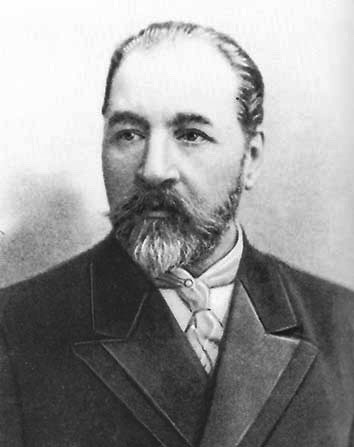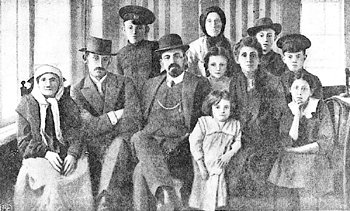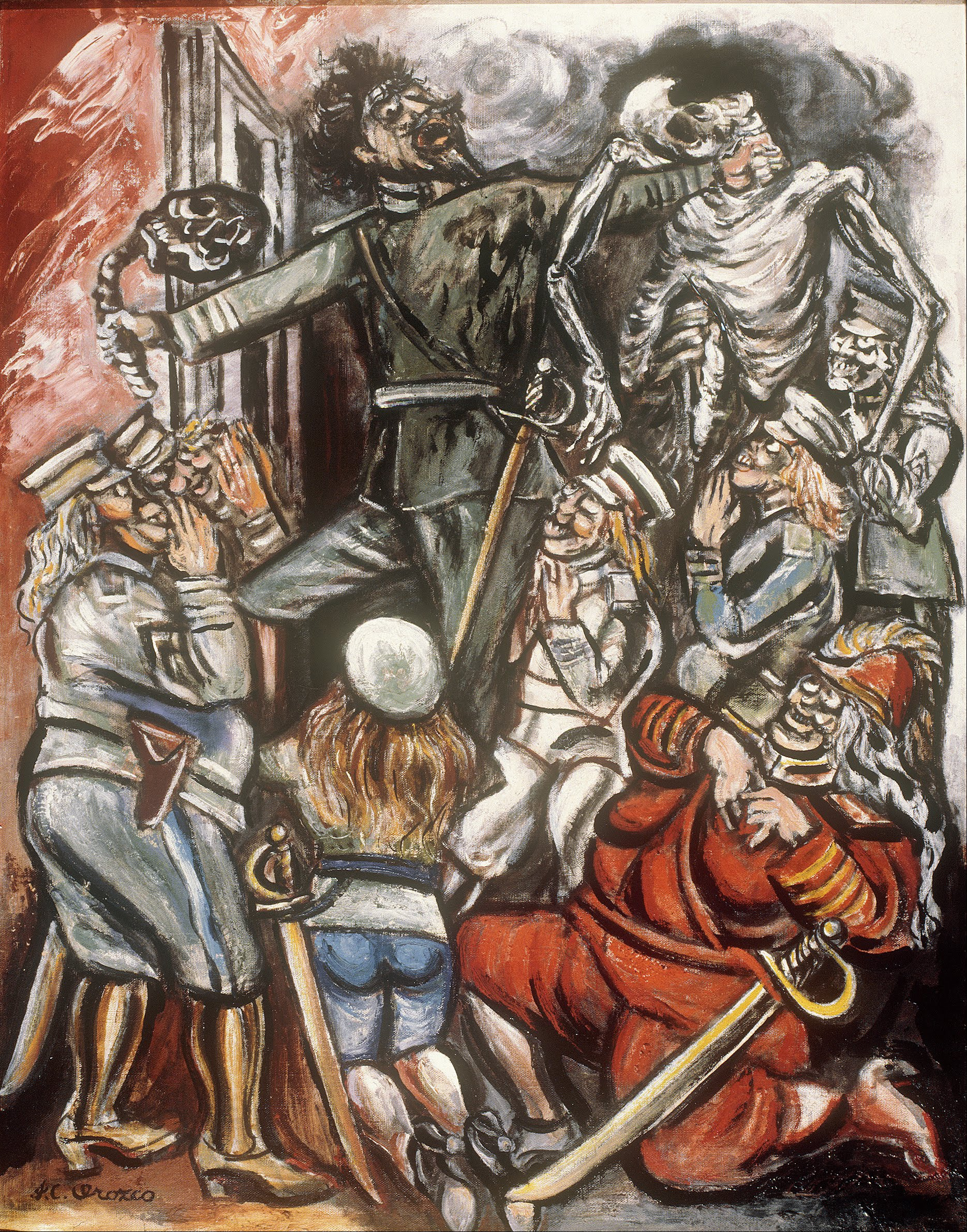|
Alexander Dubrovin
Alexander Ivanovich Dubrovin (russian: Алекса́ндр Ива́нович Дубро́вин) (1855, Kungur – unknown) was a Russian Empire right wing politician, a leader of the Union of the Russian People (URP). Biography A trained doctor, Dubrovin gave up his practice to concentrate on opposing what he saw as creeping liberalism in the Russian aristocracy, turning his own movement, the Russian Assembly, over to the newly formed URP in 1905, when he was appointed head of the new group's directorate.Philip Rees, ''Biographical Dictionary of the Extreme Right Since 1890'', p. 104 Both anti-Semitic and anti-Masonic he believed in the ''Zhidomasonstvo'' (Judeo-Masonic) conspiracy and took the lead in organising the pogroms of the Black Hundreds. Gaining a popular following amongst the peasants, petite bourgeoisie and lumpenproletariat for his demagogy, Dubrovin sat in the State Duma of the Russian Empire despite being a firm believer in absolutism and before organisin ... [...More Info...] [...Related Items...] OR: [Wikipedia] [Google] [Baidu] |
Kungur
Kungur (russian: Кунгу́р) is a town in the southeast of Perm Krai, Russia, located in the Ural Mountains at the confluence of the rivers Iren and Shakva with the Sylva (Kama's basin). Population: 64,800 (1959); 36,000 (1939). History Kungur was founded above the Iren's mouth on the banks of the Kungurka in 1648. In 1662, it was burnt by Bashkirs. In 1663, it was rebuilt as a fortress on the place of the village of Mysovskoye. In the beginning of the 18th century, leather and footwear industries started to develop here, and in 1724, a tannery was built. By the mid-18th century, Kungur became one of the most populated areas in the Urals. In 1759, Perm administration of mining plants was moved to Kungur. By the end of the 18th century, Kungur is an important transit trade center of the Siberian road, as well as the center of leather manufacture in Perm Governorate. Kungur rope and linseed oil were widely known. In 1774, the town withstood a siege by Yemelyan Pugac ... [...More Info...] [...Related Items...] OR: [Wikipedia] [Google] [Baidu] |
Anti-Semitic
Antisemitism (also spelled anti-semitism or anti-Semitism) is hostility to, prejudice towards, or discrimination against Jews. A person who holds such positions is called an antisemite. Antisemitism is considered to be a form of racism. Antisemitism has historically been manifested in many ways, ranging from expressions of hatred of or discrimination against individual Jews to organized pogroms by mobs, police forces, or genocide. Although the term did not come into common usage until the 19th century, it is also applied to previous and later anti-Jewish incidents. Notable instances of persecution include the Rhineland massacres preceding the First Crusade in 1096, the Edict of Expulsion from England in 1290, the 1348–1351 persecution of Jews during the Black Death, the massacres of Spanish Jews in 1391, the persecutions of the Spanish Inquisition, the expulsion from Spain in 1492, the Cossack massacres in Ukraine from 1648 to 1657, various anti-Jewish pogroms in the Russ ... [...More Info...] [...Related Items...] OR: [Wikipedia] [Google] [Baidu] |
Russkoe Znamya
''Russkoye Znamya'' (russian: Русское знамя; ''Russian Banner'') was a newspaper, organ of the Union of the Russian People established in St. Petersburg by Alexander Dubrovin on , notoriously known for its antisemitic bias. It was discontinued on by the order of Petrograd Soviet. History From the first issue in November 1905 until the end of the year ''Russkoye Znamya'' was released weekly. Became daily from January 1906. Its first editor was I. S. Durnovo. From March 1906 editor's duties were assumed by P. B. Bulatsel’. ''Russkoye Znamya'' was regularly sponsored by the Moscow merchantess Ye. A. Poluboyarinova. It was also subsidized by the Russian government. The URP chairman Alexander Dubrovin often published articles in this newspaper. Other active authors were: D. I. Bulatovich, G. V. Butmi, L. Ye. Katansky, N. E. Markov, N. A. Pavlov, V. M. Purishkevich, Alexande ... [...More Info...] [...Related Items...] OR: [Wikipedia] [Google] [Baidu] |
The Fixer (Malamud Novel)
''The Fixer'' is a novel by Bernard Malamud published in 1966 by Farrar, Straus & Giroux. It won the U.S. National Book Award for Fiction (his second)"National Book Awards – 1967" . Retrieved 2012-03-30. (With essay by Harold Augenbraum from the Awards 60-year anniversary blog.) and the Pulitzer Prize for Fiction."Fiction" ''Past winners & finalists by category''. The Pulitze ... [...More Info...] [...Related Items...] OR: [Wikipedia] [Google] [Baidu] |
Bernard Malamud
Bernard Malamud (April 26, 1914 – March 18, 1986) was an American novelist and short story writer. Along with Saul Bellow, Joseph Heller, and Philip Roth, he was one of the best known American Jewish authors of the 20th century. His baseball novel, ''The Natural'', was adapted into a 1984 film starring Robert Redford. His 1966 novel '' The Fixer'' (also filmed), about antisemitism in the Russian Empire, won both the National Book Award and the Pulitzer Prize. Biography Bernard Malamud was born in 1914 in Brooklyn, New York, the son of Bertha (née Fidelman) and Max Malamud, Russian Jewish immigrants. A brother, Eugene, born in 1917, suffered from mental illness, lived a hard and lonely life and died in his fifties. Malamud entered adolescence at the start of the Great Depression. From 1928 to 1932, Bernard attended Erasmus Hall High School in Brooklyn. During his youth, he saw many films and enjoyed relating their plots to his school friends. He was especially fond of C ... [...More Info...] [...Related Items...] OR: [Wikipedia] [Google] [Baidu] |
Menahem Mendel Beilis
Menahem Mendel Beilis (sometimes spelled Beiliss; yi, מנחם מענדל בייליס, russian: Менахем Мендель Бейлис; 1874 – 7 July 1934) was a Russian Jew accused of ritual murder in Kiev in the Russian Empire in a notorious 1913 trial, known as the "Beilis trial" or the "Beilis affair". Although Beilis was eventually acquitted after a lengthy process, the legal process sparked international criticism of antisemitism in the Russian Empire. Beilis's story was fictionalized in Bernard Malamud's 1966 novel '' The Fixer'', which won the Pulitzer Prize for Fiction and the U.S. National Book Award for Fiction. Background Menahem Mendel Beilis was born into a Hasidic family, but was indifferent to religion, and worked regularly on the Shabbat and at least some of the holidays. In 1911, he was an ex-soldier and the father of five children, employed as a superintendent at the Zaitsev brick factory in Kiev. Murder of Andriy Yushchinskyi On March 12, 1911 (un ... [...More Info...] [...Related Items...] OR: [Wikipedia] [Google] [Baidu] |
Boycott
A boycott is an act of nonviolent, voluntary abstention from a product, person, organization, or country as an expression of protest. It is usually for moral, social, political, or environmental reasons. The purpose of a boycott is to inflict some economic loss on the target, or to indicate a moral outrage, to try to compel the target to alter an objectionable behavior. The word is named after Captain Charles Boycott, agent of an absentee landlord in Ireland, against whom the tactic was successfully employed after a suggestion by Irish nationalist leader Charles Stewart Parnell and his Irish Land League in 1880. Sometimes, a boycott can be a form of consumer activism, sometimes called moral purchasing. When a similar practice is legislated by a national government, it is known as a sanction. Frequently, however, the threat of boycotting a business is an empty threat, with no significant effect on sales. Etymology The word ''boycott'' entered the English language during the ... [...More Info...] [...Related Items...] OR: [Wikipedia] [Google] [Baidu] |
Absolutism (European History)
''Absolutism'' or the ''Age of Absolutism'' ( – ) is a historiographical term used to describe a form of monarchical power that is unrestrained by all other institutions, such as churches, legislatures, or social elites. Absolutism is typically used in conjunction with some European monarchs during the transition from feudalism to capitalism, and monarchs described as ''absolute'' can especially be found in the 16th century through the 19th century. Absolutism is characterized by the ending of feudal partitioning, consolidation of power with the monarch, rise of state power, unification of the state laws, and a decrease in the influence of the Church and the nobility. Absolute monarchs are also associated with the rise of professional standing armies, professional bureaucracies, the codification of state laws, and the rise of ideologies that justify the absolutist monarchy. Absolutist monarchs typically were considered to have the divine right of kings as a cornerstone of ... [...More Info...] [...Related Items...] OR: [Wikipedia] [Google] [Baidu] |
State Duma Of The Russian Empire
The State Duma, also known as the Imperial Duma, was the lower house of the Governing Senate in the Russian Empire, while the upper house was the State Council. It held its meetings in the Taurida Palace in St. Petersburg. It convened four times between 27 April 1906 and the collapse of the Empire in February 1917. The first and the second dumas were more democratic and represented a greater number of national types than their successors. The third duma was dominated by gentry, landowners and businessmen. The fourth duma held five sessions; it existed until 2 March 1917, and was formally dissolved on 6 October 1917. History Coming under pressure from the Russian Revolution of 1905, on August 6, 1905 (O.S.), Sergei Witte (appointed by Nicholas II to manage peace negotiations with Japan after the Russo-Japanese War of 1904–1905) issued a manifesto about the convocation of the Duma, initially thought to be a purely advisory body, the so-called Bulygin-Duma. In the subsequent ... [...More Info...] [...Related Items...] OR: [Wikipedia] [Google] [Baidu] |
Demagogy
A demagogue (from Greek , a popular leader, a leader of a mob, from , people, populace, the commons + leading, leader) or rabble-rouser is a political leader in a democracy who gains popularity by arousing the common people against elites, especially through oratory that whips up the passions of crowds, appealing to emotion by scapegoating out-groups, exaggerating dangers to stoke fears, lying for emotional effect, or other rhetoric that tends to drown out reasoned deliberation and encourage fanatical popularity. Demagogues overturn established norms of political conduct, or promise or threaten to do so. Historian Reinhard Luthin defined ''demagogue'' as "...a politician skilled in oratory, flattery and invective; evasive in discussing vital issues; promising everything to everybody; appealing to the passions rather than the reason of the public; and arousing racial, religious, and class prejudices – a man whose lust for power without recourse to principle leads him to see ... [...More Info...] [...Related Items...] OR: [Wikipedia] [Google] [Baidu] |
Lumpenproletariat
In Marxist theory, the ''Lumpenproletariat'' () is the underclass devoid of class consciousness. Karl Marx and Friedrich Engels coined the word in the 1840s and used it to refer to the unthinking lower strata of society exploited by reactionary and counter-revolutionary forces, particularly in the context of the revolutions of 1848. They dismissed the revolutionary potential of the ''Lumpenproletariat'' and contrasted it with the proletariat. Among other groups, criminals, Vagrancy (people), vagabonds, and prostitution, prostitutes are usually included in this category. The Social Democratic Party of Germany made wide use of the term by the turn of the century. Vladimir Lenin (1870–1924) and Leon Trotsky (1879–1940) followed Marx's arguments and dismissed the revolutionary potential of the group, while Mao Zedong (1893–1976) argued that proper leadership could utilize it. The word ''Lumpenproletariat'', popularized in the West by Frantz Fanon's ''The Wretched of the Earth'' ... [...More Info...] [...Related Items...] OR: [Wikipedia] [Google] [Baidu] |
Petite Bourgeoisie
''Petite bourgeoisie'' (, literally 'small bourgeoisie'; also anglicised as petty bourgeoisie) is a French term that refers to a social class composed of semi-autonomous peasants and small-scale merchants whose politico-economic ideological stance in times of socioeconomic stability is determined by reflecting that of a ''haute bourgeoisie'' ('high' bourgeoisie) with which the ''petite bourgeoisie'' seeks to identify itself and whose bourgeois morality it strives to imitate. The term is politico-economic and references historical materialism. It originally denoted a sub-stratum of the middle classes in the 18th and early-19th centuries. In the mid-19th century, the German economist Karl Marx and other Marxist theorists used the term ''petite bourgeoisie'' to identify the socio-economic stratum of the bourgeoisie that consists of small shopkeepers and self-employed artisans. Definition The ''petite bourgeoisie'' is economically distinct from the proletariat and the ''Lumpen ... [...More Info...] [...Related Items...] OR: [Wikipedia] [Google] [Baidu] |










